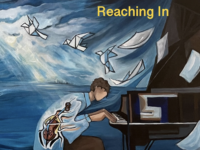The New York-based MicroCorgi is at heart a jazz piano trio. Though the basis of the group’s sound is jazz, it stretches those boundaries. A lot, as MicroCorgi melds jazz, ambient and electronica influences into a laid-back affair.
Start with “Cosmosphere,” the opening cut on MicroCosmos. At first, it is mostly a vehicle for Andrew McGowan’s jazz piano. Then it starts to get a little spacey, with Yuto Kanazawa’s echo-laden guitar and McGowan’s synth. Which is all well and good, until the vocoderized voice (presumably McGowan’s) crashes the proceedings.
The following “Avocados Every Day” starts off with a heavy synth bass, but after that is more straight-ahead (i.e. no vocoder). Kanazawa’s jazzy rhythm eventually morphs into lead lines, playing off his bandmate’s piano. He eventually turns things over to McGowan until his repeated rhythms take the spotlight to the end on what may be the highlight of MicroCosmos.
MicroCorgi drummer Ilya Dynov gets a chance to shine on “6 8 Tune” and again on “Alayshiki.” The former is a dreamy jazz piece where his cymbal splashes add color. The latter is the most rock-inflected tune on MicroCosmos, and Dynov’s drum breaks alternate with and emphasize Kanazawa’s angular guitar.
“Another Day” finds Andrew McGowan adding vocalizing to his keyboard duties, though not altogether successfully. In fact, it’s likely the weakest part of MicroCosmos, other than that annoying vocoder. Then again, “Corgi,” all wah-wah guitar and synth squeaks and bubbles might win that title. By the time McGowan plays some strident piano, it’s just too late.
The relaxed “Utopia” featuring Yuto Kanazawa closes the album on a high note. His effortless soloing is reflected by McGowan before he once again struts his stuff, while Dynov keeps things moving along.
McGowan and Kanazawa share bass duties, and MicroCorgi’s multi-faceted methodology allows it to dabble in areas such bands don’t typically explore, whether it’s ambient or Afro-beat. It’s an approach that may lose listeners at one time or another, whether they’re jazz purists or not. But those willing to listen to its entirety will likely find something they enjoy.
- Jon Anderson, Reza Khan, CSNY + Others: Ross Boissoneau’s Best of 2024 - December 30, 2024
- Tower of Power, Jennifer Hudson, Ben Folds + Others: 2024’s Seasonal Sounds - November 25, 2024
- Dave Bainbridge of Downes Braide Association: The Albums That Shaped My Career - October 9, 2024




